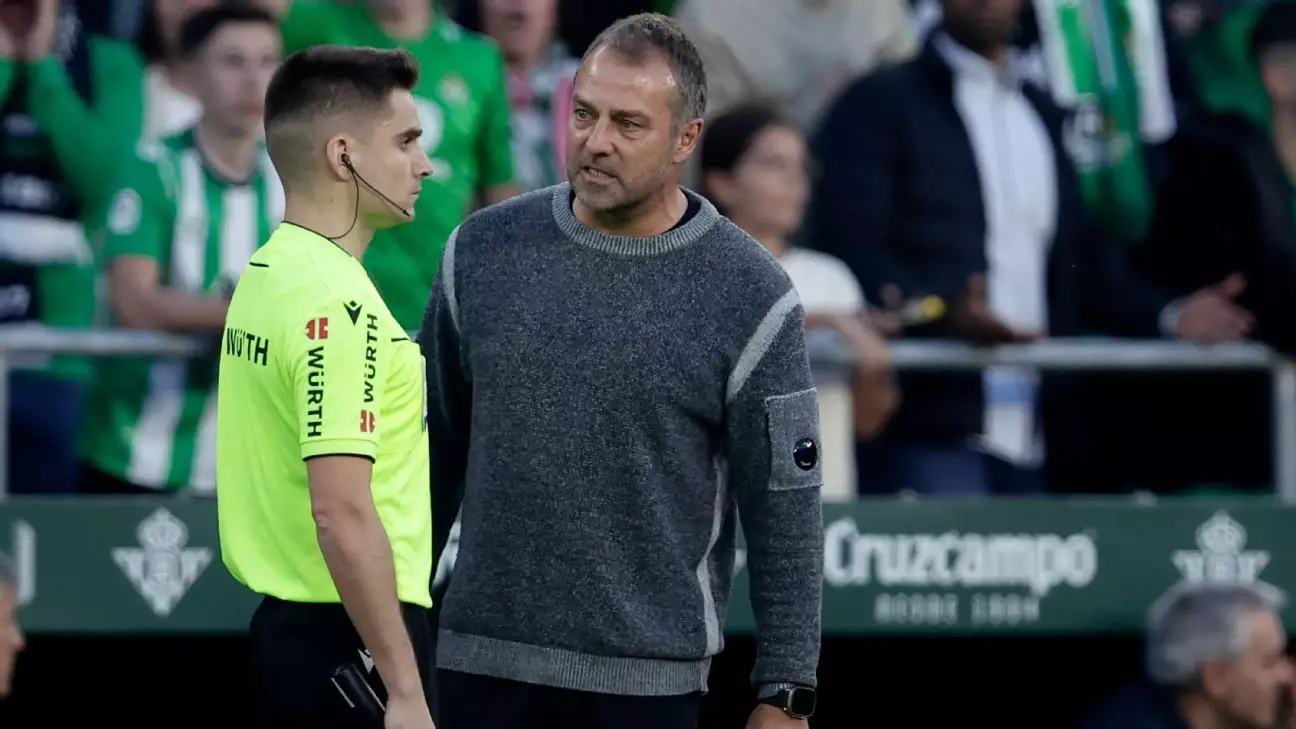In a recent LaLiga encounter, FC Barcelona’s head coach Hansi Flick found himself embroiled in controversy as he received a red card during an outing against Real Betis. The incident arose from a heated dispute regarding a penalty awarded to Betis, following a challenge by Frenkie de Jong. Flick’s emotional reaction, culminating in his dismissal from the sidelines, showcased not only the volatility of high-stakes football but also the personal responsibility that comes with being a coach at one of the world’s most revered football clubs.
Flick’s outburst stemmed from his frustration with referee Alejandro Muñiz Ruiz’s decision-making. Such moments on the touchline can be understood as manifestations of high pressure in sports, where decisions are often scrutinized. However, Flick’s subsequent acknowledgment that he needed to manage his emotions better reflects an essential aspect of leadership—self-awareness.
Flick’s two-game touchline ban serves as a stark reminder of how pivotal emotional control is, not just for coaches, but for players as well. Sport psychology emphasizes that a team’s performance can be drastically affected by the demeanor of their coach. When a head coach allows emotions to cloud their judgment, it can lead to not just personal consequences but also affect team morale.
In addressing his behavior, Flick expressed regret, stating, “My reaction wasn’t right,” emphasizing the importance of composure. His admission is crucial in a sport where mental fortitude is just as vital as physical prowess. Flick’s message to his players about not complaining to referees is significant; it reflects a coaching philosophy committed to focusing energy on aspects within their control.
This incident might also serve as a lesson for Flick moving forward. Coaches often drive performance expectations, and when they display a lack of control, it could inadvertently communicate to players that emotional outbursts are acceptable. This is particularly vital in a club like Barcelona, where the stakes are exceedingly high.
Flick’s ban temporarily removes him from the coaching role during crucial matches against Leganés and Atlético Madrid. In his stead, assistant coach Marcus Sorg will take over. Flick’s confidence in Sorg highlights a significant understanding of delegation and trust in his staff, which can cultivate an environment of teamwork and shared leadership. Such an approach is often indicative of a successful coaching framework, where coaches develop the capabilities of their assistants.
Moreover, Barcelona’s recent form illustrates resilience despite the emotional turbulence. After the disappointing draw against Betis, they managed a thrilling 3-2 victory against Borussia Dortmund in the Champions League, a game that showcased their potential to rally back under pressure. The return of key players like Ronald Araújo could reinvigorate the squad, providing them with newfound energy and depth.
Flick’s journey is still in its nascent stages. The next few matches will not only test his team’s capabilities but also his resolve as a leader. As he contemplates the future, Flick’s reflections on his behavior and the lessons learned from this experience can serve as a foundation for personal and professional growth. The notion of striving for fairness and consistency from referees, as expressed by Flick, reveals a deeper understanding of the broader dynamics at play in sports.
In positioning himself publicly for improvement, Flick not only takes accountability but also sets a benchmark for his players. It opens the door for in-depth conversations about emotional intelligence, resilience, and overcoming adversity—all pivotal elements in the fabric of sports.
Hansi Flick’s experience is a microcosm of the emotional battles faced in professional sports. It serves as an important reminder for coaches and players alike about the vital importance of emotional regulation and the influence it has on performance—on and off the pitch. As Barcelona prepares for upcoming challenges, the lessons learned from Flick’s situation may provide a roadmap for overcoming adversity and fostering a more resilient team culture.

